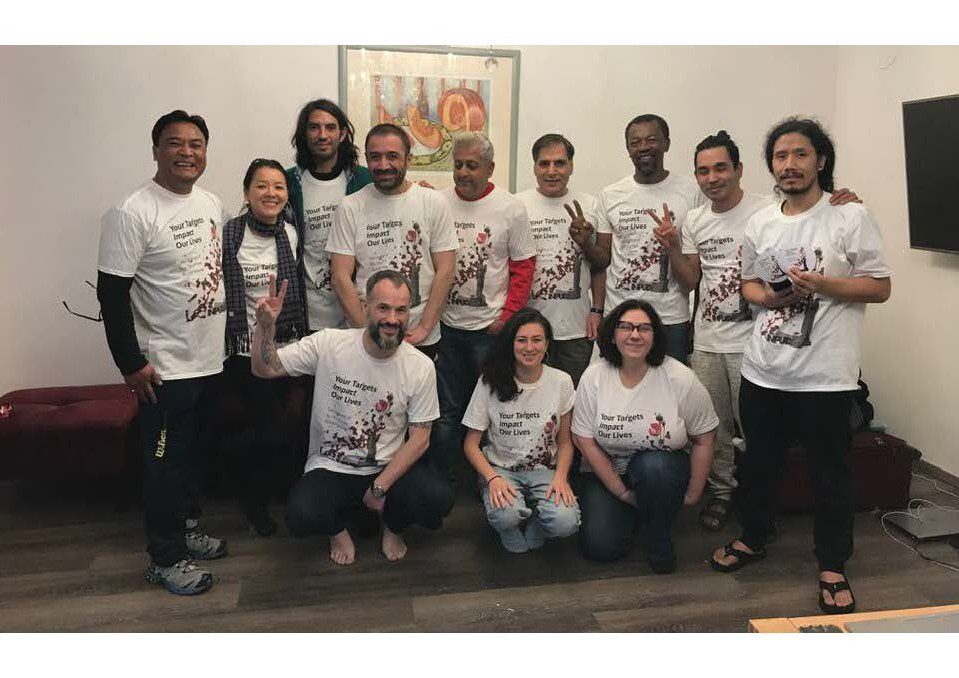INPUD – ANPUD
The Consortium of People Who Use Drugs is a global consortium of two networks: The International Network of People who use Drugs (INPUD) and the Asian Network of People who use Drugs (ANPUD). The Consortium supports the organizing and advocacy of people who use drugs to promote the human rights of people who use drugs, challenge criminalization of and discrimination against people who use drugs and increase resources for and access to services for people who use drugs.
| Grantee type: Global Consortium |
| Grant: $949,620 |
| Grant period: 2016-2018 |
| Lead organization: International Network of People Who Use Drugs (INPUD) |
| Partner organizations: Asian Network of People who Use Drugs (ANPUD) |

- People who use drugs are at higher risk of HIV and other health issues (such as HCV or overdose) in large part because of social exclusion, neglect and inaccessibility of health services and harm reduction services.
- People who use drugs face systematic human rights violations throughout the world, including stigma and discrimination, criminalization and mass incarceration, a lack of protection by police, and violence and abuse from police and others. This creates barriers to access to health services.
- In all regions of the world, people who inject drugs are disproportionately affected by HIV, and are 28 times more likely to be living with HIV than the general population. People who inject drugs account for more than one third of new HIV infections in Eastern Europe and Central Asia (EECA), in the Middle East and North Africa (MENA) region, and significant parts of HIV epidemics in West and East Africa and all other parts of the world.
- People who use drugs have important direct experience of HIV-related health needs and barriers to health services. Organizing and advocacy by people who use drugs and their allies are central to efforts to improve human rights environments, improve HIV service accessibility, and improve efficiency and effectiveness of national and international funding for health and human rights.
RCF funding 2016-2018
The Consortium of People Who Use Drugs received US$ 950,000 in funding from the Robert Carr Fund during 2016-2018, continuing steady RCF investment in collaborative work between INPUD and ANPUD since 2013. This funding was allocated to both core and strategic program costs across all major regions of the world to help build network capacity and to support globally aligned action. In 2019, the Robert Carr Fund allocated over US$ 1.9 million in renewed funding to the Consortium to sustain and build its important work.
Geographic coverage
The Consortium of People Who Use Drugs is a global consortium, convening and supporting organizations and individuals in all regions of the world. Key countries for organizing and capacity-building included India, Indonesia, Nepal, Philippines and Thailand in Asia, and Kenya, Tanzania, and South Africa in Africa.
Population coverage
The Consortium of People Who Use Drugs serves and represents people who use drugs.
Activities 2016-2018
With RCF funding in 2016-2018, advocates strengthened their national, regional and global organizing, advocated for human rights and legal protections, and developed global and regional guidance documents and campaigns. For example:
- At a global level, INPUD and ANPUD were involved in the development of several important normative guidance documents, including the 2016 United Nations General Assembly Special Session (UNGASS) Outcome Document related to global drug use, the 2016 “implementation toolkit” for comprehensive HIV and HCV programs for people who inject drugs (also known as the IDUIT), the UNODC 2017 draft guidance document “International Standards for Treatment of Drug Use Disorders”, and the UNDP 2019 “International Guidelines on Human Rights and Drug Policy”.
- INPUD and ANPUD both used RCF funding to sustain and build organizational management capacity, coalition structures and management, strategic planning and governance boards.
- At a regional level during 2017 and 2018, INPUD conducted trainings about the injecting drug user implementation toolkit (IDUIT) with regional partners in Latin America and the Caribbean, Eastern Europe and Central Asia, the Middle East and North Africa, and Francophone Africa. In 2018, INPUD also supported a new Africa-wide network of people who use drugs (AfricaNPUD) in working towards establishing a Board of Directors and a membership structure. In Asia, in 2018, ANPUD organized an innovative short film competition which resulted in 11 short films produced and disseminated that portrayed the experience of people who use drugs in India, Nepal and the Philippines.
- At a country level, INPUD and ANPUD conducted trainings about the injecting drug user implementation toolkit (IDUIT) with advocates in Indonesia, Nepal, Kenya, South Africa and Tanzania, contributed to submissions to Universal Periodic Review shadow reports from Cambodia and Vietnam, and helped to publicize rights violations and advocacy needs of people who use drugs in more than a dozen countries.
Results 2016-2018
The results from the work of INPUD and ANPUD include:
- Network strength and influence: Both INPUD and ANPUD sustained and strengthened their networks with management trainings, coalition meetings, strategic planning and support for governing boards.
- Human rights: Although there have been reversals in major countries such as Bangladesh, Brazil, Indonesia, Nigeria, and Philippines, decriminalisation of drug use is being discussed in Georgia, Myanmar and South Africa, new drug control policies incorporating harm reduction are being discussed in Myanmar and Ghana, and advocates are actively engaging with policy-makers and law enforcement officials in dozens of countries.
- Access to services: Countries such as Belarus, Georgia, Kazakhstan, Kyrgyzstan, Indonesia, Nepal, Kenya, Tanzania and South Africa are using the injecting drug user implementation toolkit (IDUIT), advocates are working to increase accessibility of HIV and HCV services for people who inject drugs.